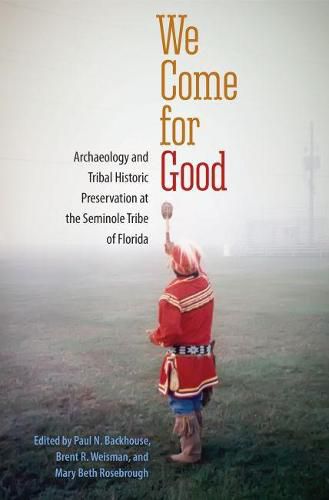Readings Newsletter
Become a Readings Member to make your shopping experience even easier.
Sign in or sign up for free!
You’re not far away from qualifying for FREE standard shipping within Australia
You’ve qualified for FREE standard shipping within Australia
The cart is loading…






This title is printed to order. This book may have been self-published. If so, we cannot guarantee the quality of the content. In the main most books will have gone through the editing process however some may not. We therefore suggest that you be aware of this before ordering this book. If in doubt check either the author or publisher’s details as we are unable to accept any returns unless they are faulty. Please contact us if you have any questions.
Offers a unique perspective on tribal approaches to managing historic preservation and addresses the multiplicity of issues common to all tribal historic preservation groups. -Joe Watkins, director, Tribal Relations and American Cultures Program, National Park Service
A concise, detailed account regarding the enormity of the task THPOs face in successfully navigating the two worlds of federal historic preservation laws and statutes and tribal cultural beliefs, knowledge, and traditions. -James Quinn, Tribal Historic Preservation Officer, Mohegan Tribe of Connecticut
An important book. Highlights the complicated, confusing, and often contradictory world navigated by the intrepid personnel of the Seminole Tribe of Florida’s Tribal Historic Preservation Office. -Ryan Wheeler, director, Robert S. Peabody Museum of Archaeology
As indigenous populations are being invited to participate in cultural heritage identification, research, interpretation, management, and preservation, they are faced with a high volume of challenging questions and demands. We Come for Good describes the development and operations of the Tribal Historic Preservation Office (THPO) of the Seminole Tribe of Florida as an example of how tribes can successfully manage and retain authority over the heritage of their respective cultures. With Native voices front and center, this book demonstrates ways THPOs can work within federal and tribal governments to build capacity and uphold tribal values-core principles of a strong tribal historic preservation program.
$9.00 standard shipping within Australia
FREE standard shipping within Australia for orders over $100.00
Express & International shipping calculated at checkout
This title is printed to order. This book may have been self-published. If so, we cannot guarantee the quality of the content. In the main most books will have gone through the editing process however some may not. We therefore suggest that you be aware of this before ordering this book. If in doubt check either the author or publisher’s details as we are unable to accept any returns unless they are faulty. Please contact us if you have any questions.
Offers a unique perspective on tribal approaches to managing historic preservation and addresses the multiplicity of issues common to all tribal historic preservation groups. -Joe Watkins, director, Tribal Relations and American Cultures Program, National Park Service
A concise, detailed account regarding the enormity of the task THPOs face in successfully navigating the two worlds of federal historic preservation laws and statutes and tribal cultural beliefs, knowledge, and traditions. -James Quinn, Tribal Historic Preservation Officer, Mohegan Tribe of Connecticut
An important book. Highlights the complicated, confusing, and often contradictory world navigated by the intrepid personnel of the Seminole Tribe of Florida’s Tribal Historic Preservation Office. -Ryan Wheeler, director, Robert S. Peabody Museum of Archaeology
As indigenous populations are being invited to participate in cultural heritage identification, research, interpretation, management, and preservation, they are faced with a high volume of challenging questions and demands. We Come for Good describes the development and operations of the Tribal Historic Preservation Office (THPO) of the Seminole Tribe of Florida as an example of how tribes can successfully manage and retain authority over the heritage of their respective cultures. With Native voices front and center, this book demonstrates ways THPOs can work within federal and tribal governments to build capacity and uphold tribal values-core principles of a strong tribal historic preservation program.